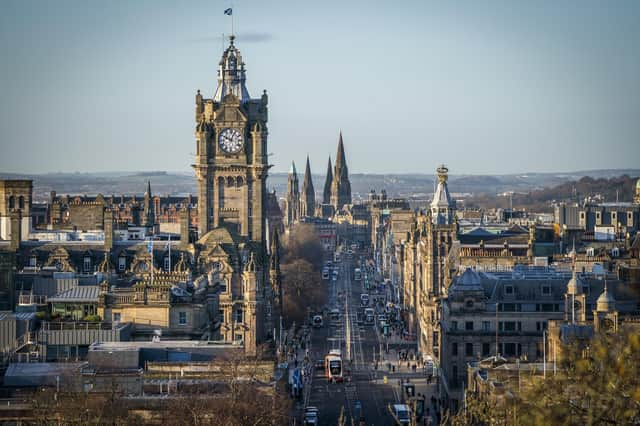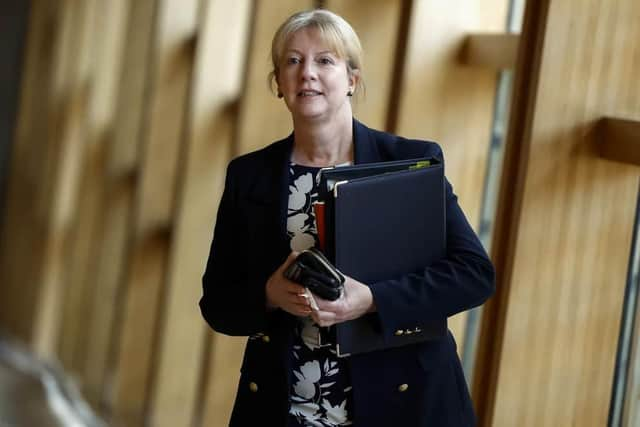Exclusive:Income tax changes in Scotland ‘create perfect storm for brain drain'


Income tax changes coming into effect in Scotland from this weekend create “the perfect storm for brain drain”, it has been warned.
Dr Liz Cameron, chief executive of the Scottish Chambers of Commerce, said divergence with the rest of the UK “has the potential to drive talent away”.
Advertisement
Hide AdAdvertisement
Hide AdBut Shona Robison, the deputy first minister, said the move will build on Scotland’s “progressive approach” by asking higher earners to contribute more.


The changes, announced last year, will introduce a new “advanced” tax band of 45 per cent on annual income between £75,000 and £125,140, meaning higher earners will pay up to £5,232 more than elsewhere in the UK.
An additional 1p will be added to the top rate, which will see income over £125,140 taxed at 48 per cent. Meanwhile, the threshold for paying the higher rate – £43,662 – will be frozen.
An estimated 49 per cent of taxpayers in Scotland will pay more tax than workers in England.
Ms Cameron said: “The changes to income tax threaten to create the perfect storm for brain drain in Scotland. This is because, for example, someone on a salary of £50,000 will now pay £1,500 more in income tax in Scotland than they would in England. For a salary of £85,000 the gap is even more pronounced at close to £2,600.
“Our latest research showed a significant increase in concern from taxation in the first quarter of 2024, suggesting that the changes to income tax are impacting firms already.
“This divergence between Scotland and the rest of the UK is no longer minor, it is significant and has the potential to drive talent away as well as feed the growing narrative that Scotland is becoming an uncompetitive place to do business.”
Catherine McWilliam, director of nations at the Institute Of Directors Scotland, said: “Our 2024 State of the Nation Directors Survey found that 82 per cent of Scottish business leaders are concerned over the country’s tax divergence with rest of UK. The introduction of a sixth tax bracket, compared to the rest of the UK’s three, means those earning over £75k annually will be taxed at a rate of 45 per cent as of 6 April 2024.
Advertisement
Hide AdAdvertisement
Hide Ad“Of those who expressed concern over the tax divergence, nearly 40 per cent (39 per cent) said that staff recruitment was likely to be impacted the most; while 34 per cent are worried about employee’s choice of location, and 27 per cent are concerned about the impact on inward investment.
“The skills gap continues to be a key concern for our members. Future recruitment and staff retention are key when business planning, and our data shows business leaders think the introduction of the new tax band in Scotland will make things even more difficult for them. Responses show that leaders clearly see Scotland’s tax regime as yet another barrier to attracting and retaining talent – and encouraging investment.”
Chris Hayward, policy chairman at the City of London Corporation, previously told The Scotsman the tax gap north and south of the border was a “risk to Scottish jobs”.
But Sean Cockburn, chairman of the Chartered Institute of Taxation’s (CIOT) Scottish technical committee, said UK-wide cuts to national insurance mean part of the tax divergence will be “somewhat” offset.
CIOT data shows Scots earning under £125,140 will pay at least £580 less in tax in 2024-25 compared to the previous year due to the combination of income tax and national insurance changes.
Mr Cockburn said: “Although the Scottish Government’s tax choices will result in higher earning Scots paying more income tax from this month, these have been somewhat offset by the UK-wide national insurance changes.
“It means that while Scots with earnings above £75,000 will pay more income tax, those with earnings under £112,900 will actually be paying less in tax and national insurance overall compared with the year just past. It illustrates what can happen when Scottish and UK tax choices interact with one another.”
Ms Robison, who is also in charge of Scotland’s finances, said the country has the “most progressive income tax system in the UK”.
Advertisement
Hide AdAdvertisement
Hide AdShe added: “The new advanced band builds on that progressive approach, protecting those who earn less and asking those who earn more to contribute more.
“Only 5 per cent of Scottish taxpayers will pay a higher tax rate compared to last year and the majority of taxpayers are still paying less than they would elsewhere in the UK.”
Tory MSP Liz Smith said professionals such as GPs, teachers and police officers “will pay more in tax than they would south of the border, while home owners and businesses are also being hit in the pocket by the SNP’s high-tax Scotland”.
She said: “Scottish businesses are making it abundantly clear that these punitive taxes only harm Scotland’s already sluggish economic growth and make us a less attractive place to live and work - putting further pressure on our public services which the SNP have neglected.
“This is in contrast to the UK Government who have stepped up and are delivering another national insurance cut – saving the average Scottish worker hundreds of pounds in tax this year. However, as the year progresses Scots will be paying more and getting less due to Shona Robison’s disastrous tax-and-axe budget.”
Scottish Labour leader Anas Sarwar said taxpayers are “being forced to foot the bill for SNP and Tory mismanagement”.
Speaking ahead of a campaign event on Friday, he said: “Humza Yousaf is detached from reality if he thinks that 1.5 million Scots should pay more tax and oil and gas giants should pay less.
“Scotland is being failed by an SNP Government that is attempting to use income tax as a sticking plaster to cover for their woeful failure to grow our economy or manage public finances.”
Comments
Want to join the conversation? Please or to comment on this article.

